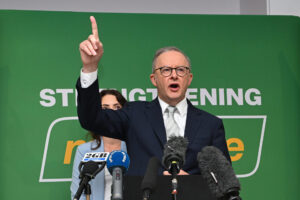Why TAFE is critical to economic recovery
The Morrison government has said it will increase investment in skills and training if the states and territories sign up to an overhaul of the Vocational Education and Training sector. ACTU President Michele O’Neil, Correna Haythorpe, federal president of the AEU and Alison Pennington, senior economist at the Centre for Future Work at the Australia Institute on why the TAFE system has been in turmoil for some time, the role it plays in the economy and how we can fix it. Part of the Australia Institute’s Economics of a Pandemic webinar series.The Australia Institute // @theAUSInstituteHost: Ebony Bennett, deputy director at the Australia Institute // @ebony_bennettGuests: Alison Pennington // @ak_penningtonMichele O’Neil // @MicheleONeilAUCorrena Haythorpe // @CHaythorpeAEUProducer: Jennifer Macey, with help from Lucy Luo and Grace CrivalleroTheme music: Pulse and Thrum
Between the Lines Newsletter
The biggest stories and the best analysis from the team at the Australia Institute, delivered to your inbox every fortnight.
You might also like
TAFE system supports $92.5 billion in annual economic benefits
New research from the Australia Institute’s Centre for Future Work shows the TAFE system supports $92.5 billion in annual economic benefits through the direct operation of TAFE institutes, higher incomes and productivity generated by the TAFE-credentialed workforce, and reduced social benefits costs.
5 ways and 63 billion reasons to improve Australia’s tax system
With a federal election just around the corner, new analysis from The Australia Institute reveals 63 billion reasons why our next Parliament should improve the nation’s tax system.
Business groups want the government to overhaul the tax system? Excellent – we have some ideas.
The landslide win by the ALP has seen business groups come out demanding the government listen to their demands despite having provided them no support, and plenty of opposition, over the past 3 years.




